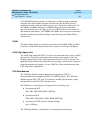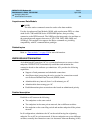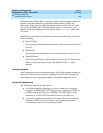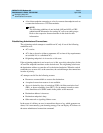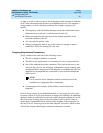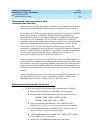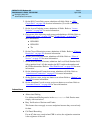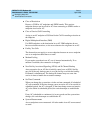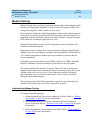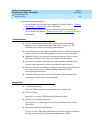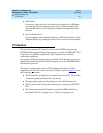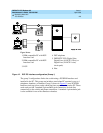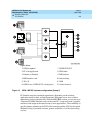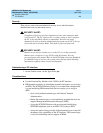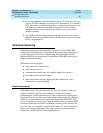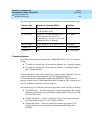
DEFINITY ECS Release 8.2
Administrator’s Guide
555-233-506
Issue 1
April 2000
Managing data calls
415Modem Pooling
15
Modem Pooling
Modem Pooling allows switched connections between digital-data endpoints (data
modules) and analog-data endpoints via pods of acoustic-coupled modems. The
analog-data endpoint is either a trunk or a line circuit.
Data transmission between a digital data endpoint and an analog endpoint requires
conversion via a modem, because the DCP format used by the data module is not
compatible with the modulated signals of an analog modem. A modem translates
DCP format into modulated signals and vice versa.
Modem Pooling feature provides pools of integrated-conversion modems and
combined-conversion modems.
Integrated-conversion modem pools have functionality integrated on the Pooled
Modem circuit pack, providing two modems. Each one emulates a TDM cabled to
a 212 modem. Integrated are modem pools not available in countries that use
A-law companding.
Combined-conversion modem pools are TDMs cabled to any TDM-compatible
modem. Combined-conversion modem pools can be used with all systems.
The system can detect the needs for a modem. Data calls from an analog-data
endpoint require that the user indicate the need for a modem, because the system
considers such calls to be voice calls. Users indicate this need by dialing the
data-origination access code field on the Feature Access Code screen before
dialing the digital-data endpoint.
The system provides a Hold Time parameter to specify the maximum time any
modem can be held but not used (while a data call is in queue).
Administering Modem Pooling
For Integrated modem poolings:
1. On the Modem Pool Group screen, administer all fields. Refer to ‘‘
Modem
Pool Group’’ on page 817 for more information.
2. On the Feature Access Code screen, administer the Data Origination
Access Code field. Refer to ‘‘
Feature Access Code’’ on page 619 for more
information.
3. On the Data Module screen, administer all fields. Refer to ‘‘
Data modules’’
on page 558 for more information.



